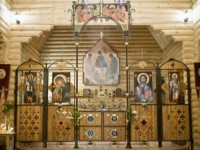 Name of God. Positive and negative theology
Name of God. Positive and negative theology
How can I summon You? «What’s Your name?» — this is how Moses asked God at Sinai. After all, the very word «God» — in the expression of the Martyr Justin the Philosopher is not a name, but a thought implanted in human nature about something inexplicable» (App.2.6). The proposition that God is incomprehensible is obvious to the human mind. And «since God is incomprehensible, He is also without a name» – says Saint John from Damascus.
But God, as He reveals Himself in the Old Testament, is not just a Force, the God of the Covenant has a personal beginning, He is One who requires a name in order to be addressed, to be invoked. And according to the book of Genesis, man not only names God’s creatures, but also names the Creator Himself. The Bible testifies that God is the Cause of everything, the Beginning, Light, Life, Almighty, Lord of the Heavenly Hosts. There are many different names of God in the Scripture that speak of God’s acts in the world and how people perceive them. But there is also a name in the Old Testament by which God calls Himself.
In the XV century before the birth of Christ, God sends Moses to lead the Jewish people, chosen to proclaim the Revelation in their midst, out of slavery in Egypt. Moses was brought up in the house of Pharaoh, but was forced to flee when, standing up for his oppressed brothers, he killed an Egyptian. And in Sinai, in the land of Midian, Moses tended his father-in-law’s sheep. And there, one day he saw a strange phenomenon – a burning but not burning down Bush, surprised Moses came closer. «And God called to him out of the midst of the Bush, and said: «Moses! Moses!» He said, «Here I am, Lord.» (Ex. 3:4), and God commanded Moses to bring out his people from Egypt. Moses does not understand how they will believe him: «Behold, I will go to the children of Israel and say to them: «Behold, God of your fathers has sent me to you». And they will say to me: «What is His name?» «What should I tell them?» God said to Moses: «I am who I Am. This is My name forever.» (Ex. 3:13-14)
«I am who I am» is what the name means. In Hebrew, it is written with four consonants — the sacred Tetragrammaton: יהוה — י (Yod) ה (Hei) ו (Vav) ה (Hei). In the tradition of Judaism, this name was surrounded by such reverence that only once a year it was pronounced by the high priest, entering the Holy of Holies of the Jerusalem temple with the blood of sacrificial animals.
In all other cases, when reading the Scriptures in prayer houses — synagogues, this name was replaced by the word «Adanai» (the plural form of the word «Lord»). And in the third century BC in Alexandria, when the Pharaoh Ptolemy Philadelphus ordered to translate the Scriptures for the whole Roman Empire, the language was Greek, then in the story of the appearance of God to Moses, the meaning of the tetragrammaton was provided through the word «he» — «which art», in all other places of the Scripture, according to the oral tradition, the sacred name was transmitted via the word — the title for God – «Kirios» – the Lord. Now in the Russian language this word refers only to God, but when in the Gospel people turned to Christ: «Lord…», it meant «Lord», but very soon, even with the first disciples, the word «Lord» got the meaning of God’s name and this was fixed in the Apostolic Epistles. And so the Hieromartyr Irenaeus of Lyons may have written in the third century that «the apostles in their own name would not have called anyone else Lord, except the true God, the Father and His Son.» Therefore, to call Jesus Lord means to confess Him to be God, who revealed Himself mysteriously in the Old Testament, and revealed Himself fully and perfectly in the New Testament.
And «no one can call Jesus Lord but the Holy Spirit.» (1 Cor. 12:3) That is, faith in Jesus as the true God is a gift of God. And when, in the first centuries of Ecclesiastical history, the refusal of Christians to recognize the Emperor as «Lord» made them political criminals, it was only the Grace of the Holy Spirit that gave them the power to profess their faith in spite of the fear of death that followed their refusal to pay divine homage to Caesar.
And on the icon of Christ, on His nimbus — the sign of his shining Holiness, a Cross is inscribed and three Greek letters are inscribed in it: omega, omicron, nu -Being. And if Christ is the Real God – Being Itself, then everything else is opposed to Him as if it does not exist, as if it does not have a true being. And indeed, for us, the real Life is Christ Himself! And He tells us that whosoever will not be joined to Him… – «Verily I say unto you, saith Christ, if any man eat not My Flesh and drink My Blood, he shall have no life in him.» (In. 6:53). This is how the Lord speaks about the Sacrament of Communion, and for a person, both the Light and the True and authentic Life are Christ Himself.
The sacred tetragrammaton got its reading as «Jehovah» in the XIV century, when the vowels of the word Adonai were added to the four consonants of the tetragrammaton. Later, in the XIX century, they began to consider that it is more correct to read the tetragrammaton as «Yahweh».
Becoming a Mere man, Being receives a human name, that was given by the Archangel Gabriel to the Virgin Mary on the day of the Annunciation. And, like after His Birth God dwells in man, so there is a name of God in the name of Jesus, through one letter of the Holy Tetragrammaton, so that it means Jehovah saves.
And that «burning Bush» — a burning, but fireproof Bush, from which Moses received the revelation, is also a very capacious symbol — a sign of the Union of the divine and human natures in the Person of the Lord Jesus Christ, where humanity did not disappear – did not burn, but was sanctified and deified. According to Orthodox teaching, God and man reside in the Lord Jesus Christ simultaneously and «undivided» and «inseparably», and the Bush on fire is the image of the Union of the two natures in the Lord.
«The burning Bush» is also a name of one of the icons of the Virgin Mary, from Whom the invisible and disembodied God Light was born as a man.
The entire God-human nature of the Church is determined by the fact of God’s incarnation, and therefore the «burning Bush» is also an image of our salvation, our communion with Christ – our participation in the Eucharist.
One of the prayers of the following to Holy Communion says: «being grass, I partake of Fire and – a wonderful miracle – I do not get singed.»
God is closer to us than anyone or anything, for His Eternal Kingdom must reside in the heart of man, God gives us Himself in the Church, in the Sacrament of Communion, and at the same time he remains Unapproachable and Unknowable – the Creator of the Universe, the God of the Heavenly hosts. (Both the common sense and the path of philosophy, and also a spiritual experience of a human makes the unknowability of God clear.) And the Church expresses its doctrine not only in affirmative words and terms, but in terms of the so-called «apophatic», that is, a «negative» theology, which shows the impossibility to express God in a human language and the infinite ways of knowing God. It is possible to divide all the names of God revealed to us in the Scriptures into two groups: those relating to the unknowable divine nature and to how God manifests Himself in the world. To the first one belong: properly-God, and also: Existing, the Lord. To the second one — all the others. From the first group of names comes the apophatic form of theology, from the second – the cataphatic. According to the apophatic form of theology: God is above affirmation and above definition.
Man is called to communion with God, but how can man know the invisible God, if the ancient sage said: «it is difficult to understand God, but it is impossible to utter» (Plato. The Timaeus).
Nevertheless, «His invisible things, his eternal power, and his Deity, from the creation of the world through the contemplation of creatures, are visible.» (Rome. 1:20) It is the revelation of creation about its Creator. But God Himself reveals Himself perfectly in the Scriptures. But no word, no name, can perfectly reveal the One who is our Creator and God. Moreover, in the words of Saint Gregory of Nyssa: «Even names that seem to us to affirm, have, in fact, a negative meaning. Thus, when we say that God is good, we only state that there is no place for evil in Him. The name «beginning» means that He is without beginning.»
«God,» in the words of St. John of Damascus, » is an uncreated, beginningless, infinite, indefinable, indescribable, inaccessible Being.»
In addition to words with negative prefixes, patristic negative theology uses words with superlative prefixes — God is the Trinity, the most Holy Super-Essential essence, as well as paradoxical phrases that speak of «comprehending the incomprehensible», «seeing the invisible», and «divine darkness» instead of the expected divine light.
The truth about God is broader, deeper than language can express and man can perceive. And indeed: we believe in One God, but this God is the Trinity; our Lord Jesus Christ is God, and he is Man; the Church is an Assembly of believers, and It is the Body of Christ. Divine truth is antinomic for human consciousness, it combines opposite poles. Therefore, the language of the Church and the theology of the Church express themselves not only in positive terms, but also in negative and mutually exclusive terms. Thus, our God is a Nameless Name, a Beginningless Beginning, «God is not this, but He is not that either; He is not in one place; but He is not anywhere else either. Everything is confirmed in Him at the same time, and again, He is nothing of all» — says the theologian, whose works are signed by the name of Dionysius the Areopagite.
The incomprehensible God is comprehended in the living experience of the Church, and the Invisible one is seen by the eyes of faith. And if «a person himself does not see God, but God, because He wants it, becomes visible to people, to those who He wants to, when He wants to, and the way He wants to» — writes Irenaeus of Lyons. .
Thus in the theophanies God revealed Himself to the Old Testament saints, and when the Jewish people came out of Egyptian slavery, the Lord went before them in a cloud by day and in a pillar of fire by night. Thus God revealed His glory. No one has ever seen God himself. The only-begotten Son, who is in the bosom of the father, He hath declared Him.» (In. 1:18)
Leo the Great wrote that after the Incarnation, «the invisible in His nature became visible in ours, the incomprehensible was pleased to become comprehensible, the eternal began to be in time, the Lord of the universe took the form of a slave, hiding the immensity of His greatness, the impassive God did not disdain to become a man subject to suffering, and the immortal – to surrender Himself to the law of death.»
The mystery of the incarnation of God, the mystery of the Union of two natures: the divine and the human in the One Person of the Incarnate God of the Word, is expressed by the fathers of the fourth Ecumenical Council (481) in terms of apophatic – negative theology together with the fathers of the Council of Chalcedon, and we «confess The Same Christ, the only-begotten in two natures, undivided, unchangeable, inseparably, indivisibly known.»
Inseparably — from the moment of the Annunciation, from the moment of the incarnation until the end of time, Christ is always The same-the God-man.
Indivisibly – neither Deity nor Humanity exist separately, and the New Testament, speaking of the Lord, attributes to Him as God human actions, and as Man – divine actions.
But the Divine and Human nature unchangeably retain their Properties, being undivided in a Single Personality of the God-man, Humanity does not «dissolve» in the Deity, and the Deity does not absorb, but illuminates His Humanity.
In the Person of Christ the Saviour, where God and man are always «undivided» and «inseparable», the Mystery of the Church as a Divine-Human organism is revealed to us, as well as the last word about the meaning of human life and human vocation.
The Lord is the Head of the Church, unites us in the sacraments «undivided», but also «inseparably», and transforms the congregation of believers into His mystical Body – the Church.




